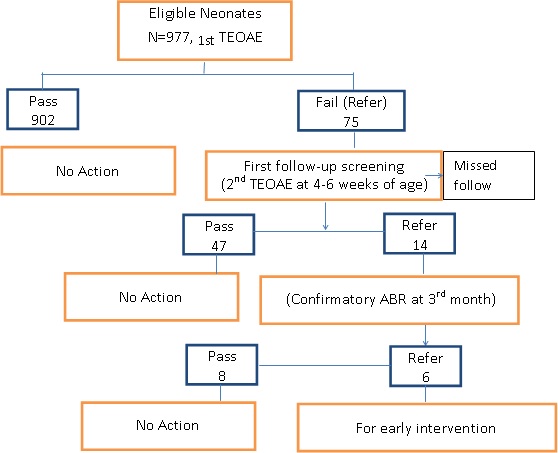New born hearing screening programme at tertiary care hospital from South Karnataka-our experience
Abstract
Background: Universal hearing screening is implemented in many developed countries. However, neither universal screening, nor high risk screening, exists uniformly all over India. Screening of only high risk neonates can miss upto 50% of babies with hearing loss, hence a cost effective universal screening programme will be the viable option.
Objective: To determine the incidence of hearing impairment in normal newborns with no risk factors delivered in a tertiary hospital in south Karnataka, India.
Methods: All eligible newborns were screened using two staged Transient Evoked Oto Acoustic Emissions (TEOAE) at birth and at 4-6 weeks of age and confirmatory test by auditory brainstem response (ABR) at 3 months of life.
Results: Out of 977 babies, 14 were detected with hearing loss at first follow up at 4-6 weeks of age. Of these 14 babies,6 were confirmed to have hearing impairment using ABR at 3 months of age. Two of them had severe sensory neural hearing loss and the other four were diagnosed with moderate to severe hearing loss. The incidence of hearing loss in our study is 6.1 per 1000 neonates with no risk.
Conclusions: A two-staged TEOAE hearing screening can be feasible option as newborn hearing screening method, for early detection of hearing impairment in all major hospitals. Universal hearing screening is the need of the hour to detect large number of hearing impaired in the magnanimous “no risk” newborn population in our country.
Downloads
References
2. Stach BA, Ramachandran VS. Hearing disorders in children. In: Madell JR, Flexer C eds. Pediatric Audiology: Diagnosis, Technology, and Management. New York: Thieme Medical Publishers Inc; 2008. P. 3-12.
3. Mason J A, Herrmann K R. Universal Infant Hearing Screening by Automated Auditory Brainstem Response Measurement. Pediatrics. 1998; 101(2):221–228.[pubmed]
4. Yoshinaga-Itano C, Sedey AL, Coulter DK, Mehl AL. Language of early- and later-identified children with hearing loss. Pediatrics. 1998 Nov;102(5):1161-71.[pubmed]
5. Norton SJ, Gorga MP, Widen JE, et al. Identification of neonatal hearing impairment: evaluation of transient evoked otoacoustic emission, distortion product otoacoustic emission, and auditory brain stem response test performance. Ear Hear. 2000 Oct;21(5):508-28.[pubmed]
6. R. Keren, M. Helfand, C. Homer, H. McPhilips and T. A. Lieu, “Projected Cost Effectiveness of Statewide Univer- sal Newborn Hearing Screening. Pediatrics.2002;110(5):855-864.[pubmed]
7. Early identification of hearing impairment in infants and young children. NIH Consens Statement. 1993 Mar 1-3;11(1):1-24.[pubmed]
8. Joint Committee on Infant Hearing. Year 2007 position statement: principles and guidelines for early hearing detection and intervention programs. Pediatrics. 2007;120(4):898-921.
9.www.who.int/pbd/deafness/world-hearing-day/WHD2016_Brochure_EN_2.pdf.Accesed on 1st october 2018.
10. American Academy of Pediatrics, Joint Committee on Infant Hearing Year 2007 position statement: Principles and guidelines for early hearing detection and intervention programs. Pediatrics. 2007;120(4):898-921.
11. Patel H, Feldman M. Universal newborn hearing screening. Paediatr Child Health. 2011 May;16(5):301-10.[pubmed]
12. Canale A, Favero E, Lacilla M, et al. Age at diagnosis of deaf babies: a retrospective analysis highlighting the advantage of newborn hearing screening. Int J Pediatr Otorhinolaryngol. 2006 Jul;70(7):1283-9. Epub 2006 Feb 20.[pubmed]
13. Rai N, Thakur N. Universal screening of newborns to detect hearing impairment--is it necessary? Int J Pediatr Otorhinolaryngol. 2013 Jun;77(6):1036-41. doi: 10.1016/j.ijporl.2013.04.006. Epub 2013 May 1.[pubmed]
14. Sangita M K, Patil H. Universal Screening in Newborn. Journal of medical science and clinical research.2017;5(8):26396-26402.
15. Augustine AM, Jana AK, Kuruvilla KA, et al. Neonatal hearing screening--experience from a tertiary care hospital in southern India. Indian Pediatr. 2014 Mar;51(3):179-83. Epub 2013 Oct 5.[pubmed]
16. Nagapoornima P, Ramesh A, Srilakshmiet al. Universal hearing screening. Indian J Pediatr. 2007 Jun;74(6):545-9.[pubmed]
17. Paul AK. Early identification of hearing loss and centralized newborn hearing screening facility-the Cochin experience. Indian Pediatr. 2011 May;48(5):355-9.[pubmed]
18. Anand S, Tiwari A, Goyal S. Prospective study for newborn hearing screening-A experience from tertiary care centre in central India. Int J Pediatr Res.2016;3(9):668-671.doi:10.17511/ijpr.2016.9.07
19. Nelson HD, Bougatsos C, Nygren P; et al. Universal newborn hearing screening: systematic review to update the 2001 US Preventive Services Task Force Recommendation. ediatrics. 2008 Jul;122(1):e266-76. doi: 10.1542/peds.2007-1422.[pubmed]
20. Korver AM, Konings S, Dekker FW, Beers M, Wever C C, Frijns J H M et al. Newborn hearing screening vs. later hearing screening and developmental outcomes in children with permanent childhood hearing impairment. JAMA. 2010;304(15):1701‒1708.
21. McCann DC, Worsfold S, Law CM, Mullee M, Petrou S, Stevenson J et al. Reading and communication skills after universal newborn hearing screening for permanent childhood hearing loss. Arch Dis Child. 2009;94(4):293‒297.doi:10.1136/adc.2008.151217
22.Yoshinaga-Itano C, Coulter D, Thomson V. The Colorado Newborn Hearing Screening Project: Effects on speech and language development for children with hearing loss. J Perinatol. 2000;20(8 Pt 2suppl):S132‒S137.

Copyright (c) 2018 Author (s). Published by Siddharth Health Research and Social Welfare Society

This work is licensed under a Creative Commons Attribution 4.0 International License.


 OAI - Open Archives Initiative
OAI - Open Archives Initiative


